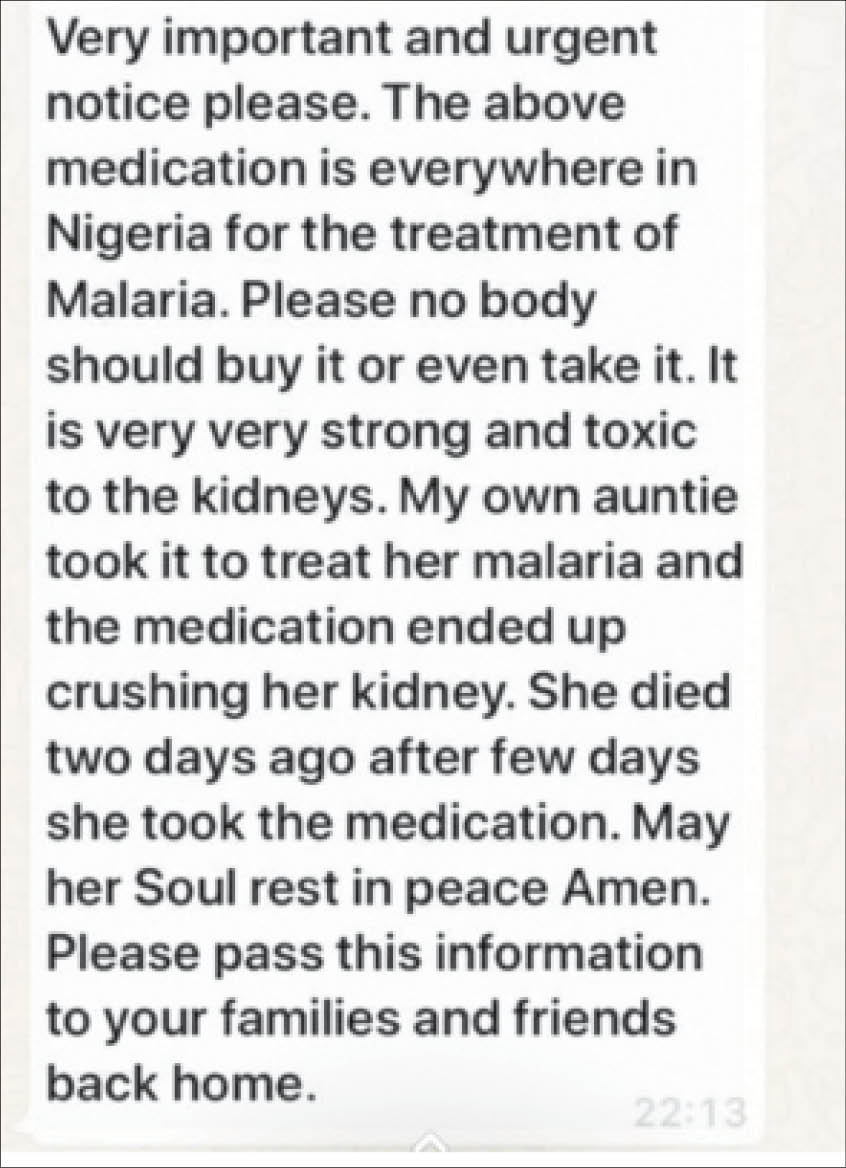Can P-Alaxin cause kidney failure?
Claim: There has been a claim making the rounds that the use of a popular anti-malaria drug ‘P-Alaxin’ was responsible for the death of an individual. Verdict: The claim is false. Findings show the drug is approved by the National Agency for Food and Drug Administration Control NAFDAC and there is no information on the […]

Claim: There has been a claim making the rounds that the use of a popular anti-malaria drug ‘P-Alaxin’ was responsible for the death of an individual.
Verdict: The claim is false. Findings show the drug is approved by the National Agency for Food and Drug Administration Control NAFDAC and there is no information on the major media platforms in the country that indicated that the drug has been responsible for death of those who use it.
- How Akwa Ibom health workers struggle to keep PHCs afloat
- Poor facilities, overpopulation hinder learning in Minna public schools
Full text
Following the death of 66 children in the Gambia from acute kidney injuries which was linked to some cough syrups imported into the country, a post is being shared that warns Nigerians not to use an anti-malaria P-Alaxin as it could lead to kidney problems and death.
The message says, “Very important and urgent notice please. The above medication is everywhere in Nigeria for the treatment of Malaria. Please no body should buy it or even take it. It is very strong and toxic to the kidneys. My own auntie took it to treat her malaria and the medication ended up crushing her kidney. She died two days ago after few days she took the medication. May her Soul rest in peace Amen. Please pass this information to your families and friends back home.”
What is P-Alaxin?
According to an article by PublicHealth.com, P-ALAXIN is an Artemisinin-based combination therapy (ACTs), a product extracted from a plant – sweet wormwood. The drug is used for the treatment of serious malaria as it helps to kill faster the parasites that cause malaria and it contains certain degrees of Dihydroartemisinin 40mg/piperaquine 320mg.
However, the World Health Organization (WHO) discouraged using the medicine only when on medication as there have been signs that malaria parasites are developing resistance to the drug.
Can it affect the kidney?
Contrary to the claim, researches have been conducted on how artemisinin can serve as a potential treatment for kidney disease.
As such, Luo Y. in a journal titled ‘Artemisinin-Based Smart Nanomedicines with Self-Supply of Ferrous Ion to Enhance Oxidative Stress for Specific and Efficient Cancer Treatment,’ concluded that it can treat kidney cancer with the emergence of new technologies such as ARS-based smart nanomedicine.
Speaking with Daily Trust, a pharmacist, Jelili Kelani, described the information as a false alarm.
“Somebody just decides to raise false alarm and you can’t verify who posted the story first. For now, there is no information either from NAFDAC or other pharmaceutical office that the drug causes what the person says.
“The issue is: who is that person? We don’t know. Who is the affected person? In which hospital did the person die? It does not make sense. How did the person know that it was the kidney that was affected?
“Yes, every drug is a potential poison, even paracetamol. P-Alaxin is an ACT drug for managing malaria. If P-Alaxin has problem, then all ACTs will have problem. Unless we are saying it is that particular brand that has issues, but the drug is being advertised over and over again and our patients take the drug.”
He added that for a drug to be the genesis of kidney failure, then the person already has kidney impairment, and in that situation not supposed to take any drug in their normal dosage.
“Most drugs should not be taken in the normal dose. If that person actually has issues, may be the person already has kidney problem, when the person takes a drug that should be taken in normal dose, then it will affect the person. It is not the drug that caused the problem.”
